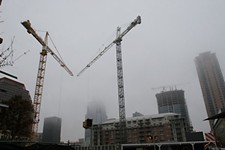Austin @ Large: Free Money!
The city is broke, so why is it giving candy to strangers?
By Mike Clark-Madison, Fri., July 2, 2004

You should know by now that whenever a local leader starts talking about how Austin is, or was, "sleepy," you should wake up. (It's not the same as "laid-back" or "relaxed." Those are good things. Sleepiness is not.) And so it was last Thursday, when Council Member Brewster McCracken began to speechify about how Austin went from being "a sleepy college and government town to an international technology hub," and how this "has really brought a lot of great things to this city." Ladies and gentlemen, wake up and grab your wallets.
The price tag for the latest dose of civic caffeine is about $11.5 million, the estimated value (we're filing an open-records request for the cocktail napkin) of the incentives approved unanimously last week for Samsung, which is already here, and Home Depot, which is not. Well, not in this way: Austin has plenty of Big Orange Boxes, but the home improvement chain wants to build a back-office data center to handle the digital traces of its march from Atlanta to the sea.
Home Depot has already bought a site (somebody else's abandoned data center ... hmm) in Austin, which would suggest they aren't being dragged to Texas against their will, but that means nothing in the world of economic development. So Austin has supplied $7 million of its own sugar; on Tuesday Travis Co. kicked in another $6.2 million. The state ($3.7 million) and AISD ($TBA, but probably $RealMoney otherwise destined for recapture) will also ante up. Meanwhile, Samsung gets its own $4.3 million in city largesse, all from Austin Energy, which plans to invest that money in state-of-the-art, high-end wiring on both sides of the chipmaker's very large electric meter.
This has become a fairly routine story in urban Texas, boring enough to make you almost forget that the city is broke. Broke as in $19.4 million in red ink staining the upcoming General Fund budget, which is financed both by transferred Austin Energy revenues and the property taxes the city wants to spot Home Depot. And broke as in literally billions of dollars (well, at least $1 billion) in capital improvements to the roads, sewers, and water lines, all of which will someday have to be paid for out of citizen pockets. Leaving aside the attitude Austinites often strike when talking about "boondoggles" and "corporate giveaways," given that our fiscal crisis is not yet over, do we really have any business being (in McCracken's words) "open for business"?
Samsung – Well, Maybe
Before y'all start coming up with clever comebacks involving apples and oranges, let's be clear that the packages wrapped up by council last week include two different kinds of apples. Of the two, the Samsung variety is tastier and more nutritious.
While the city-staff sales pitch describes several "substantial economic benefits" of Samsung's planned expansion, including new city tax revenue and "at least 240 permanent positions," the real clincher is the last one: "an increase in the annual base rate revenues of Austin Energy of approximately $1.6 million." Indeed, under the proposed terms of the "performance-based" package, the chipmaker has to increase annual energy consumption by at least 60 million kilowatt-hours (and create the 240 jobs) or give the money back.
In other words, the Samsung package is a preferred-customer deal between Austin Energy and a major client, just as that firm might get from Avis car rental. Keeping the customer satisfied is a priority for AE execs right now, though at present users like Samsung don't have much alternative for electric service. That could change, at any moment and with great speed.
Not only does Austin Energy need to worry that its current state-supplied get-out-of-dereg-free card will be revoked at the whim of the Legislature, but it now also has to consider that big users like Samsung may build their own on-site power generation, which is becoming easier and easier to do. (Moreover, semiconductor technology like that of Samsung can produce solar photovoltaic cells.) In principle, AE embraces the concept of "distributed generation," but it frets noticeably at the same time about the impact it could have on its business model.
So does City Hall, which has become quite accustomed to a lifestyle made possible by Austin Energy revenue. Plus, Samsung has been here for a decade, given back some to the community, and offered Austin some international visibility, so there are arguably some soft benefits to be reaped if Austin continues to pay to play. Plus, AE (unlike most city departments) has the money.
Depot-It-Yourself
Home Depot, though, is a whole different box of screws. Even the Statesman's Rich Oppel has seen fit to question authority on this one, engaging in some actual reporting in his Sunday piece and raising the question: Wouldn't they come here anyway? (I mean, they already bought a site and all.) If Austin is no longer a competitive venue for new tech jobs in the Sunbelt, then we need to spend that money working on fundamentals, not on frills for individual companies.
The toss-around figure for this package is 500 new permanent positions, which appears to include clerks and custodians and interns despite all the talk of "high-value tech jobs." Unlike the Samsung deal, the current Home Depot package makes no mention of performance standards requiring that those jobs be created, or filled with unemployed Austinites. If there's a wealth of spin-off jobs to be created by a big data-center shop – the magic "multiplier effect" – no one has yet explained very well what those might be.
And the $200 million investment Home Depot is planning to make is, mostly, going to go out of town, to whoever supplies the retailer with its computer systems. (Hopefully, it's Dell.) The city's big revenue play here would be to collect personal property tax on all that hardware. And that's exactly what City Hall, instead, wants to rebate to Home Depot.
I have my own cocktail napkin here, and even if all 500 of those jobs were new, filled by Austinites making average Austin incomes and owning average Austin homes, the city tax revenue generated by those employees would fall somewhere short of the $14,000-per-job value of the city's Home Depot package – which itself may end up being less than half of the total multi-jurisdictional package. For a data center? For an out-of-town company? What about local businesses? Are they entitled to fourteen grand in tax candy per employee? Shouldn't they be? ![]()
Got something to say on the subject? Send a letter to the editor.










